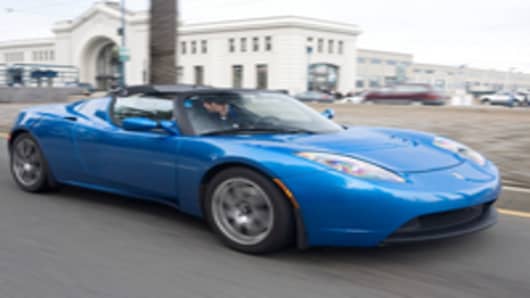WASHINGTON — Detroit’s automakers are focused this week on convincing Congress to provide them $25 billion in federal aid.
But there is another $25 billion auto industry loan program, set up by the Department of Energy to quicken the development of fuel-efficient cars.
Because it is open to any company with a promise and a plan to make more fuel-efficient cars, it has set off something of a gold rush, as a number of companies besides the Big Three, including Silicon Valley firms and old-line Detroit auto suppliers, angle for a piece of the program.
Many of the companies flocked to Washington for a meeting Monday sponsored by the Energy Department to review the rules governing the direct loans, which the government is expected to start making in coming weeks.
“The government is saying, ‘Here, come and get it,’ and we will,” said Curt Brainard, a spokesman for EcoMotors International, a Troy, Mich., company that is developing a two-stroke diesel engine that it says will allow compact cars to get 100 miles to the gallon. “It will give us a tremendous benefit to have the government behind us and as we ramp up with investors.”
In addition, Tesla Motors, a privately held company in San Carlos, Calif., has applied for $400 million in two loans. One would be used to develop an advanced battery and power train for the company’s electric car — currently Tesla makes an electric roadster with a $109,000 price tag. The other loan would be to develop a lower-priced midsize sedan, the “Model S,” using the same technology.
Another application has come from XP Vehicles, based in San Francisco, which is seeking $40 million to develop two electric cars, a two-seat runabout and a four-seat mini utility vehicle.
Scott Redmond, chairman of XP, said the government loans were an important source of financing, given the economy.
“Venture capital money is frozen and that has put us in dire straits,” said Mr. Redmond, who added that it cost “hundreds of millions” to develop a new car. “We have a glut of customers, we just don’t have enough credit. Financing is dead. We are facing the same problems as the Detroit companies. Everyone is really counting on this money.” Lachlan W. Seward, director of the Advance Technology Vehicles Manufacturing Loan Program, said that five applications had been received to date, but declined to disclose details.
The three Detroit automakers have, so far, applied for at least $22 billion of the program’s money, according to Michael Carr, counsel to the Senate Energy Committee, which initiated the legislation. Mr. Carr, who had been briefed on the loan program’s status, said he was concerned that smaller companies might be left to fight over an disproportionately small share. The deadline for the first group of loan applications is Dec. 31.
Large auto suppliers also attended the briefing Monday, including representatives of Tenneco , Delphi , Visteon and Goodyear . Many asked questions about environmental impact studies, and requirements that companies meet criteria regarding their financial strength to receive a loan.
The Energy Department rules favor domestic automakers and suppliers. Manufacturing facilities eligible for the loans must be in the United States, along with all engineering and retooling. Preference is also given for modernization of manufacturing plants that are more than 20 years old, and most of the foreign automakers’ plants in the United States are more recent than that.
The program is aimed at supporting the development of cars at least 25 percent more fuel-efficient than those made in 2005.
General Motors has said the money it is applying for — it would not give an exact amount — would be directed toward the development of the Chevrolet Volt, an electric car that is expected to need $2 billion for development costs. Ford Motor , which has said it will seek $7 billion in funds, is looking to convert three large plants that make large trucks and S.U.V.’s into making smaller, more fuel-efficient cars.
Some have raised concerns about the program, including raising the possibility that the Detroit automakers will try to use the funds to cover everyday expenses.
“This program would be a failure if the Big Three used it as a way to fund business as usual and deprive money that could be used for innovative technologies,” said Mr. Carr.
William J. Kohler, head of the automotive practice at the Detroit law firm Butzel Long, said the program should broadened to finance projects still on the drawing board.
“The program is not oriented at funding for fundamental research, but to facilities and engineering for existing components,” said Mr. Kohler.
Craig Fitzgerald, an auto industry consultant at Plante & Moran in suburban Detroit, also noted that fuel-efficient gains were often made in small increments, not in the major breakthroughs that the government was seeking to support.
“They need to give weight to medium-range achievements as well as to breakthroughs,” said Mr. Fitzgerald.



